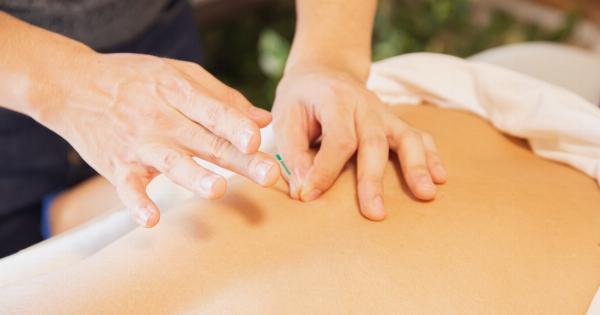Headaches are a common condition that many people experience at some point in their lives. While there can be various causes for headaches, one often overlooked culprit is neck tension.
Neck tension, also known as muscle stiffness or tightness in the neck and surrounding areas, can result in frequent headaches or migraines. Understanding the connection between neck tension and headaches is crucial for finding effective ways to manage and alleviate the symptoms.
The Anatomy of Neck Tension
The neck is a complex structure consisting of bones, muscles, ligaments, and nerves. When the neck muscles become tight or tense, they can compress nerves, restrict blood flow, and cause referred pain in the head, leading to headaches or migraines.
Neck tension can be caused by various factors such as poor posture, stress, muscle strain, injury, or underlying medical conditions.
How Neck Tension Triggers Headaches
When neck muscles tighten, they can create tension in the surrounding areas, including the scalp, face, and jaw. As a result, this tension often radiates to the head, causing headaches.
The tight muscles in the neck can put pressure on the nerves that supply the head and face, leading to a heightened sensation of pain. Additionally, the restricted blood flow caused by neck tension can deprive the head and brain of oxygen, triggering headaches.
Identifying the Symptoms of Neck Tension-Related Headaches
Neck tension-related headaches typically manifest with distinct symptoms. These can include:.
- Dull or throbbing pain that starts at the base of the skull and radiates to the temples or forehead
- Aching or stiffness in the neck and shoulders
- Sensitivity to light or sound
- Difficulty concentrating
- Nausea or dizziness
It’s important to note that not all headaches are caused by neck tension. Consulting a healthcare professional is crucial for an accurate diagnosis and appropriate treatment plan.
Self-Care Techniques for Neck Tension and Headache Relief
Thankfully, various self-care techniques can help alleviate neck tension and reduce the frequency or intensity of headaches. Try incorporating these practices into your daily routine:.
- Ergonomic adjustments: Ensure your workspace, whether at home or in the office, is set up to promote good posture. Invest in an ergonomic chair, maintain proper monitor height, and take regular breaks to stretch and relax your neck muscles.
- Stretching exercises: Perform gentle neck stretches regularly to relieve tension. Slowly tilt your head from side to side, forward and backward, and rotate it in a circular motion. Be mindful not to overstretch or strain your neck muscles.
- Stress management: Stress is a leading cause of neck tension. Engage in stress-relieving activities such as meditation, deep breathing exercises, or taking up a hobby to help manage stress levels and prevent tension buildup in your neck.
- Heat or cold therapy: Apply a hot or cold compress to your neck and upper shoulders for 15-20 minutes to reduce muscle tension and soothe headaches. Experiment with both heat and cold to see which brings you the most relief.
- Proper sleep position: Ensure your sleeping posture supports the natural curvature of your neck. Invest in a supportive pillow that keeps your neck aligned with your spine to prevent waking up with neck stiffness and headaches.
- Hydration and nutrition: Dehydration can exacerbate muscle tension and headaches. Stay properly hydrated throughout the day and maintain a balanced diet rich in magnesium, B vitamins, and omega-3 fatty acids to support muscle health and reduce the likelihood of headaches.
- Posture correction: Be mindful of your posture throughout the day. Avoid slouching or hunching over, as it can strain the neck muscles. Practice good posture by keeping your shoulders back and your head aligned with your spine.
- Regular exercise: Engage in regular physical activity to improve muscle strength and flexibility. Exercise promotes better blood flow and releases endorphins, which can reduce tension and alleviate headaches.
- Relaxation techniques: Explore relaxation techniques such as yoga, tai chi, or progressive muscle relaxation to help release tension from your neck and promote overall relaxation.
- Neck massages: Regularly give yourself or seek professional massages targeted at the neck and shoulder area. Massages can help relax muscles, improve blood circulation, and relieve tension headaches.
Professional Treatments for Neck Tension and Headache Relief
If self-care techniques alone don’t provide sufficient relief, it may be necessary to seek professional treatments for more severe or persistent neck tension-related headaches. Some effective professional treatments include:.
- Physical Therapy: A physical therapist can provide targeted exercises, manual therapy, and other interventions to address neck tension and improve mobility and function.
- Chiropractic Care: A chiropractor can perform adjustments and spinal manipulations to alleviate neck tension and reduce headaches.
- Acupuncture: This ancient practice involves inserting thin needles into specific points on the body to promote relaxation, reduce muscle tension, and relieve headaches.
- Massage Therapy: Professional massage therapists can target specific trigger points and tension areas in the neck and shoulders to alleviate pain and reduce headaches.
- Medication: In some cases, healthcare providers may prescribe medications such as muscle relaxants or pain relievers to manage acute pain and reduce the frequency of headaches.
- Biofeedback: This technique uses electronic devices to monitor specific bodily functions and teach individuals how to control muscle tension, potentially reducing headache frequency.
For persistent or chronic headaches associated with neck tension, it’s essential to consult a healthcare professional who can individually assess your condition and recommend the most appropriate treatment option.
Conclusion
Neck tension can indeed result in frequent headaches or migraines. Understanding the connection between neck tension and headaches is crucial for implementing effective management strategies.
By practicing self-care techniques, focusing on good posture, and seeking professional treatments when necessary, individuals can alleviate neck tension, reduce the frequency of headaches, and improve their overall well-being.






























